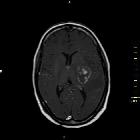toxoplasmosis




Toxoplasmosis is a common worldwide parasitic disease caused by the protozoan Toxoplasma gondii. It is usually an asymptomatic infection, but it is related with several sequelae when acquired in-utero or related with cerebral abscesses due to its reactivation in immunocompromised patients (e.g. HIV/AIDS).
Please refer to the following articles for further discussion:
Epidemiology
25-30% of the world's population is estimated to be infected by T. gondii, with a large range of prevalence between countries (from 10 to 80%) .
Clinical presentation
Patients typically present with fever, headache, and malaise. They may later develop personality change and seizures.
Pathology
Human infection occurs via three primary routes :
- ingestion of infected meat that has been inadequately cooked
- ingestion of oocysts contained within feces passed by an infected cat
- direct transmission from a woman to her fetus
Radiographic features
Please, refer on the following articles:
History and etymology
The parasite was first described by Charles Nicolle and Louis Manceaux in 1909 .
Siehe auch:
und weiter:

 Assoziationen und Differentialdiagnosen zu Toxoplasmose:
Assoziationen und Differentialdiagnosen zu Toxoplasmose:
